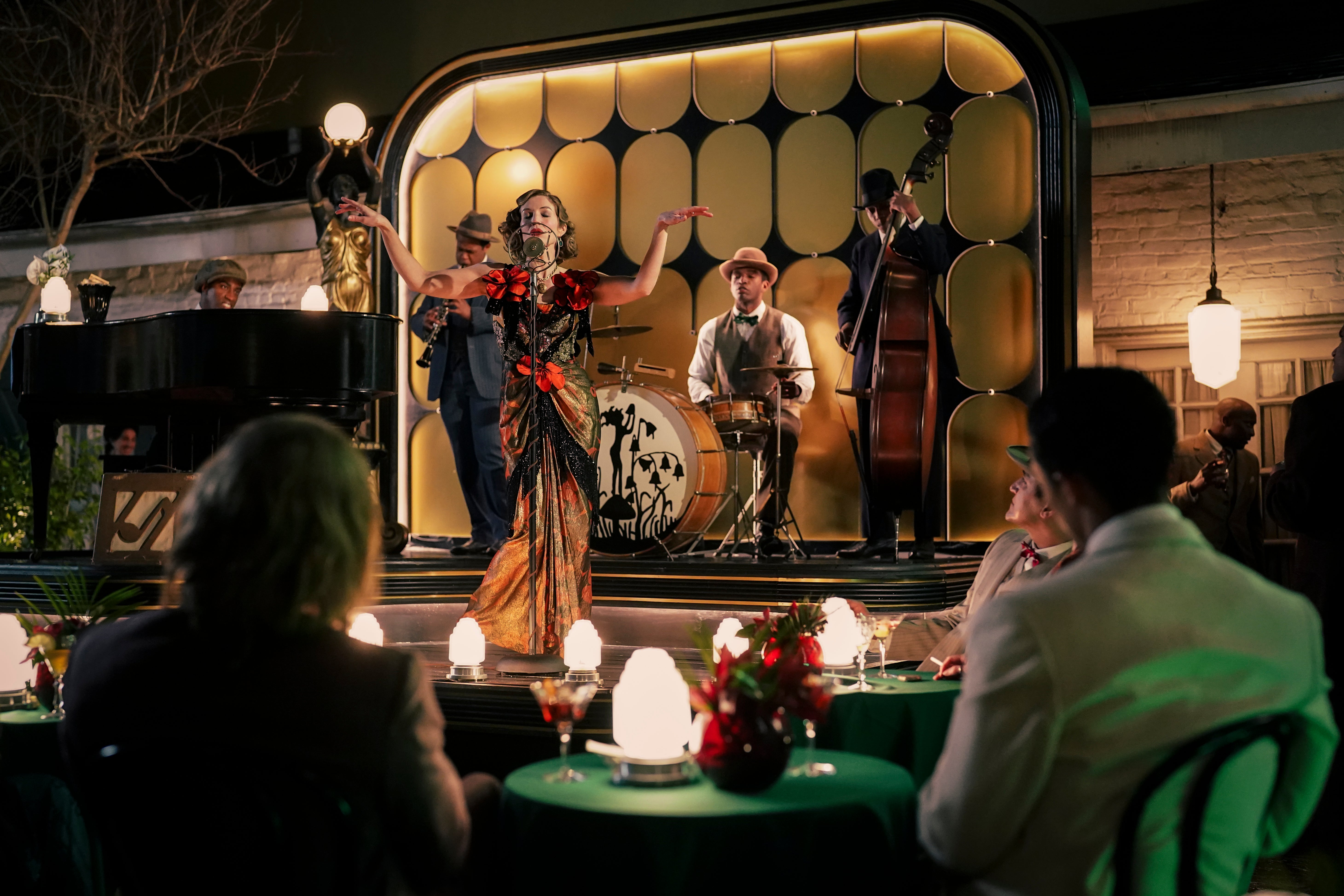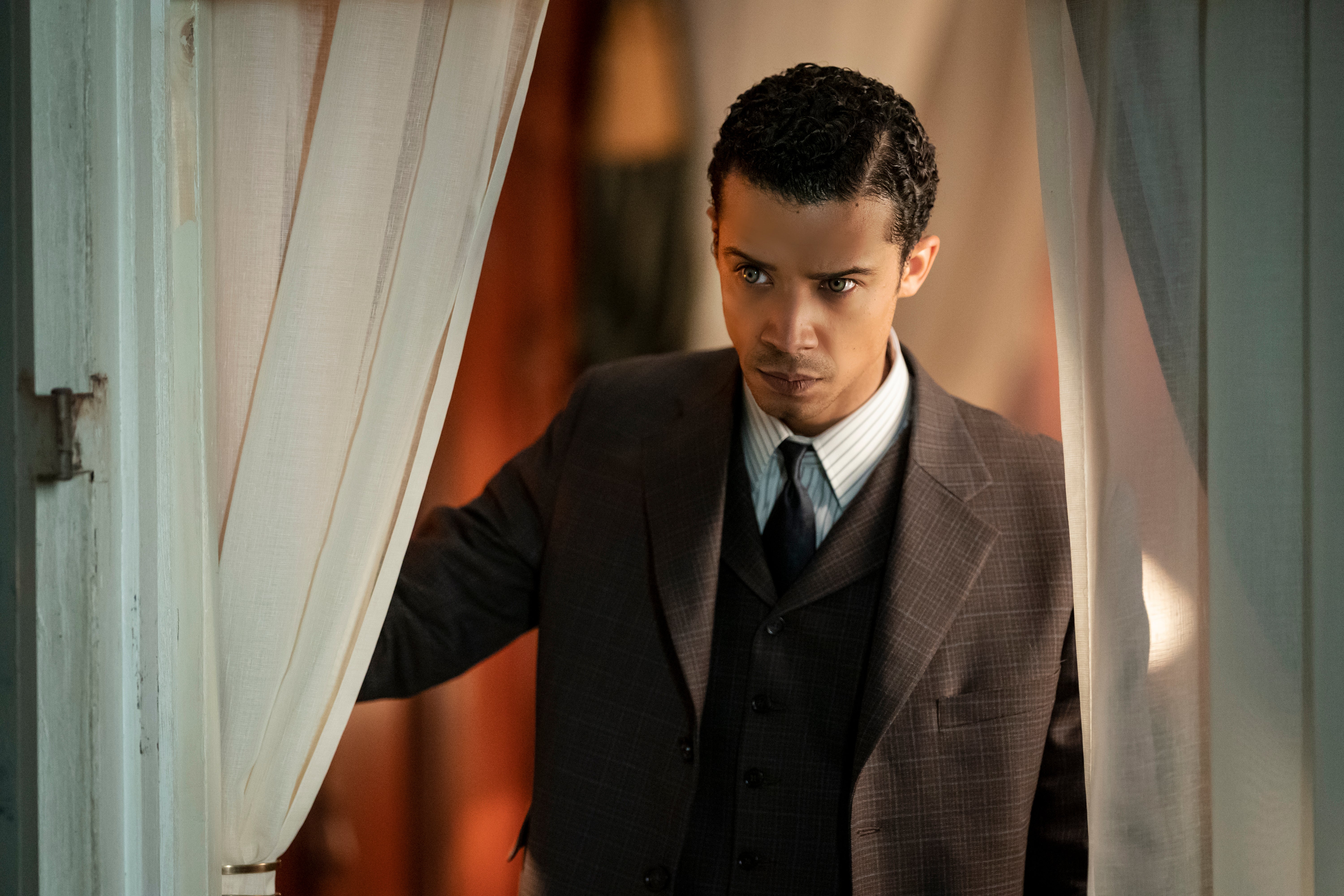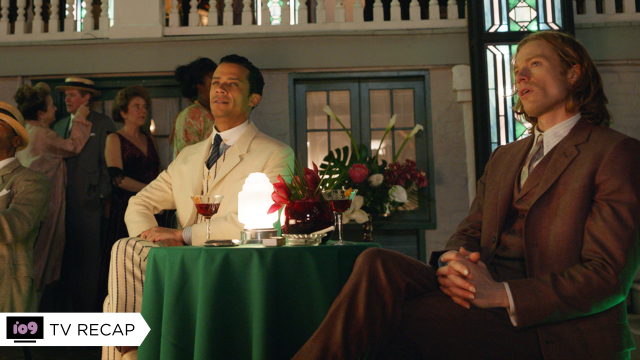There might come a time when I am not amazed by the dexterity of the writing on Interview With the Vampire, but the third episode does not disappoint. “Is My Very Nature That of a Devil” opens in Jackson Square, with Lestat and Louis reading together on a bench. Lestat reads from a newspaper column, describing a sanitised history of the square to a New Orleans native who likely has heard all of this before. “Say anything about how they used to take runaway slaves, cut their heads off, and pike ‘em on the iron gates as a warning?” Louis asks, not even looking up from his book. Lestat pauses and then turns back to the paper, saying, “I’m only halfway through. Let’s see.”
This sets the stage for the rest of the episode, a complicated drama that centres around deep moral questions, exploring the way that these characters plaster over the holes they leave in the wall. The damage is still there; you can’t un-hit the wall. But perhaps Louis can cover it up with something less violent.

Louis tells Lestat that he wants to avoid killing people who do not deserve it. Lestat doesn’t see the point. Everyone, he says, is capable of depravity. As Louis and Lestat begin their hunt, Lestat teases Louis. All these requirements for salvation, all these decisions, all these choices. Whereas Louis clings desperately to morality like a life raft, Lestat doesn’t even consider it worth investigating. He is not human, why should he think like one? Even after they find a victim, Louis refuses to drink from his vein, killing a cat instead. Lestat, disgusted, says nothing.
They head to the Azalea, where Louis and Lestat continue to test each other’s patience. Towards the end of their fight, Lestat picks on the hapless Mr. Morton — the pianist accompanying the new singer, Antoinette Brown. That’s Jelly Roll Morton, for those wondering. Lestat heckles him off the stage, begins playing a classical piece of piano (which does not go over well with the folks coming in to hear ragtime and jazz) before improving a melody that would later become Morton’s famous “Wolverine Blues.”
Daniel immediately cuts in. Demands confirmation that Louis really means to say, on record, that Lestat is responsible for the “Wolvervine Blues.” He then emphasises that Louis seems to be rewriting his history. Daniel plays clips from their first interview in 1973 and compares them to their current interaction. The difference is not just that Louis seems to have softened his stance, but that he’s walking back everything he said. He had previously described Lestat as stupid, a sow’s ear, frail. Now? He’s a confidant, a sharp-edged hunter, a manipulative genius.
“The version we speak of now is the more nuanced portrait,” Louis says in defence. As Daniel presses, talking about victimization, abuse, the different ways that psychological trauma can affect memory, Louis insists that he wasn’t abused or a victim. Daniel, acting again as the audience, as all of us, as the former reader, says that Louis acts like he was “locked in some fucked-up gothic romance.”
What we hear next is the crux of the entire show. This disparity is, Louis says, quoting from Daniel’s own memoir, “the odyssey of recollection.” What Interview With the Vampire doing is reinterrogating the text from a new perspective, from a Black, queer, contemporary perspective, reminding us — the viewers — that this is a new story, strung together from the bones of the original, made to perform in a dioramic chamber play. This is the struggle of the series, of Daniel’s interviews, of the audience that might remember the original book. And then, Daniel decides to throw away the tapes. Now the story will stand on its own. Now, the real rewriting can begin.

Back in New Orleans, Louis eats rats while Lestat seduces the lounge singer. In the aftermath of Lestat’s wandering hands, the two vampires proceed to have the queerest, least honest conversation possible about open relationships, commitment, and trust in the backyard. Louis asks if he can “fuck whoever he wants” and Sam Reid delivers four lines; “Of course,” repeated four times, with increasing absurdity and camp each time, which shifted this show from “surprisingly good,” to “amazing, actually” during my first watch.
As we move into the political maneuverings of Louis around the poker table, what we are watching is a set-up. Every single scene, line, movement in this episode, and in every other episode, has a second run. There is no wasted space, no moment where narration is filling in what would otherwise be dead air. Everything that’s laid down will rise again. We are watching a master class in writing where every single moment is just a domino in a line, waiting to be knocked down by a bigger, badder complication.
In the Azalea, Louis meets up with an old friend, Jonah, who’s about to be shipped off to the front. They take a stroll and reminisce about the old days. Then, they take their reminiscing a bit further, and have a less-than-romantic tryst while walking along a back road by the bayou. As Louis gets sucked off, he sates his desire for blood by biting on his own wrist, avoiding the murder of his old friend.
When Louis returns to Lestat he notices mud on Lestat’s boots. He tells Daniel that it wasn’t proof, but it could have been a sign that Lestat was following him. Daniel asks if it rained that night, and Louis pauses. Did it? His memories flash; Louis and Jonah under the trees in darkness, only moonlight above them. Louis and Jonah under the tree, thunder crashing, rain pouring. The truth is missing. The truth is whatever Louis decides to tell Daniel. This story isn’t the truth; it’s just an old memory. What we’re witnessing is the remainder of a life.
Louis attempts to visit his family, but it goes poorly. He’s a ghost, a monster, a devil, and now everyone knows it. He returns home, to Lestat, who is throwing a massive party full of enlisted, uniformed men, and might as well have hung a “Welcome Home, Cheater!!” sign across the front porch. Lestat is playing the piano, soldiers are drunk and singing and laying out a feast for his wayward love. “You can fuck them, I can eat them.”
Lestat seems to know that all of Louis’ hard work — his family, his fortune, even the last fleeting kind of friendship he had — is actively being destroyed, and he’s simply helping it along. Louis’ foundation is underwater and he is drowning in salt water and he blames Lestat for his first death, the loss of his relationship with his family, even the politics that seem determined to bring down his establishment due to the skin colour of its owner. Then, when Alderman Fenwick suggests that he’d be willing to buy back the Azalea at 15 cents ($0.21) on the dollar, at 15% of its actual value, the horrible, insipid, racist irony hits you like a punch to the gut. Once again, every line in this show has a second life.
There is something incredibly nuanced and difficult to articulate about the layers of storytelling dedicated to understanding the Black experience. This episode feels like a lot of the seeds planted in earlier episodes have fully germinated, blooming like an ill-smelling flower shown off in the worst kind of garden. Racism is centered, Louis’ feelings, his struggles are centered. He’s called thuggish and chased out of his own establishment. And still, we focus on Louis, his face, his fate. Daniel says “take a Black man in America, make him a vampire, fuck with that vampire, and see what comes of it.”

Remember what I said about second lives? Here it is again; this is the point of this episode, this wrestling with Anne Rice’s material, this rewriting of her work. Here is an expression of her gothic horror that she could never have written. The pain, the fury, the anger of being a Black man who is continually fucked with. The memory of Anne Rice hangs heavy over this series, but episode three is truly where the writers have hung up her mantle and made their own. Daniel’s line is a masterful elucidation of all the themes laid out earlier in the episode. A reminder of everything we’ve seen until now, a reminder that we are heading into unwritten reimaginings.
Louis confronts the Alderman. It’s a testament to both the writing and Anderson’s sheer fucking acting abilities that every time someone so much as sends an off-hand glance towards Louis that I truly believe in the punitive power of murder. When the Alderman shoots at Louis the vampire doesn’t even flinch. He’s not going to be killed by the likes of this man. “I’ll let you reload,” Louis says, and I swear to god, I screeched while watching. This scene is everything. The comeuppance, the violence, I love it.
So Alderman Fenwick is murdered, horrifically strung up on the pikes in Jackson Square, the Azalea house is burned by avarcisious competition, and all of Storyville goes up in flames. Inside the townhouse Louis shares with Lestat, he tosses one last match onto the fire. He tells Lestat that the two of them will never work. Louis tells Lestat that he will always be alone, which is, if you’ve been paying attention to the show, Lestat’s worst fear.
Louis goes into the burning streets of Storyville and the episode ends just as he finds Claudia, whom he calls his redemption. We see nothing of her but an outline, and we have to wait until episode four to truly meet her. What we have at the end of the episode is a broken, shattered man who has lost his business, his family, his lover. As he grasps at one thing he can fix, something he might be able to save, the themes of the episode ring out. Claudia’s story, like the rest of the story so far, will be told different. Will be told slant, monstrous, new. It will be subject to an odyssey of memory, just like the rest of us.
Interview With the Vampire airs new episodes Sunday at 10 p.m. ET on AMC. Online, AMC+ is airing episodes one week early.
Want more Gizmodo news? Check out when to expect the latest Marvel and Star Wars releases, what’s next for the DC Universe on film and TV, and everything you need to know about House of the Dragon and Lord of the Rings: The Rings of Power.
Editor’s Note: Release dates within this article are based in the U.S., but will be updated with local Australian dates as soon as we know more.
